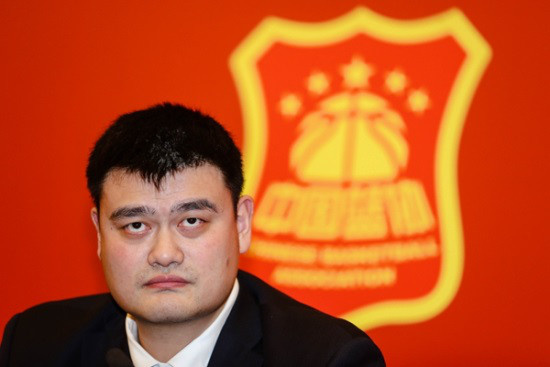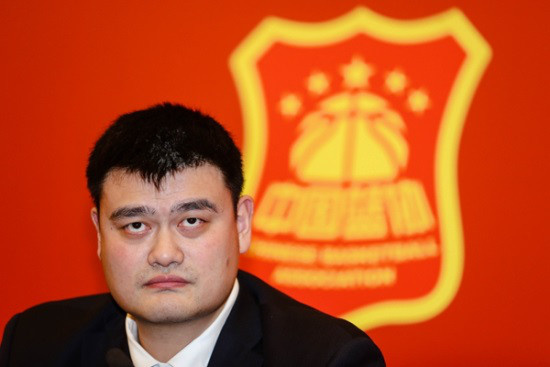By Zhao Cheng from People’s Daily

Thirty-seven-year-old Yao Ming, China's basketball legend, was voted as the president of the Chinese Basketball Association (CBA) on Feb. 23. Election of the sports star, the first non-governmental personage to take the position, was seen as an important step towards reforming the organization.
The Shanghai-born Yao is famed in both domestic and world stage since he was not only the first Chinese to be drafted as the No 1 pick in the NBA history, but also the first Asian player ever to enter the Naismith Memorial Basketball Hall of Fame. Those achievements have made him a national icon in China.
After retirement, Yao transformed himself from a star to a boss. By becoming an investor of the CBA club Shanghai Sharks, Yao contributed to Chinese basketball with a new identity.
Yao’s election has garnered great attention in China. Most Chinese people recognize his qualifications and ability, and expect him to roll out more reforms in office.
Many believed that the reshuffle of CBA's leadership structure, represented by Yao's election, represents profound future changes of the organization as well as the country's sports reform.
China's sports industry was basically state-managed previously. The CBA, for example, shares the same staff with the basketball management center of China's General Administration of Sports, and has less rights to make a decision.
After a separation from the basketball management center, a more independent CBA will focus more on its business function. The changes will help it better mobilize social resources and adjust work mechanisms.
“A door is open to the overall development of Chinese basketball, and a new path is ahead if it walks ahead,” Yao said.
The basketball star told the press previously that the first thing upon his election is to promote deep-rooted reform of the leagues, adding that he plans to build the CBA leagues into a public cultural product by using market-oriented approaches.
The new president said he would make efforts to let the clubs under CBA make up the deficits and get surpluses, or at least make ends meet. "That is an important basis for ensuring a healthy development of CBA," Yao noted.
As for the construction of the national basketball team, Yao vowed to show more respect to the personal willingness of all athletes by turning the current requisition system to an invitation system. The selection system will be innovated as well.
Analysts said that CBA needs decisive reforms as it did not play its due role in the long run, and Yao’s election can be regarded as a starting point.
They added that the successful leadership transition of CBA can also work as a reference for reforms of other Chinese athletic associations and clubs as well.
The Shanghai-born Yao is famed in both domestic and world stage since he was not only the first Chinese to be drafted as the No 1 pick in the NBA history, but also the first Asian player ever to enter the Naismith Memorial Basketball Hall of Fame. Those achievements have made him a national icon in China.
After retirement, Yao transformed himself from a star to a boss. By becoming an investor of the CBA club Shanghai Sharks, Yao contributed to Chinese basketball with a new identity.
Yao’s election has garnered great attention in China. Most Chinese people recognize his qualifications and ability, and expect him to roll out more reforms in office.
Many believed that the reshuffle of CBA's leadership structure, represented by Yao's election, represents profound future changes of the organization as well as the country's sports reform.
China's sports industry was basically state-managed previously. The CBA, for example, shares the same staff with the basketball management center of China's General Administration of Sports, and has less rights to make a decision.
After a separation from the basketball management center, a more independent CBA will focus more on its business function. The changes will help it better mobilize social resources and adjust work mechanisms.
“A door is open to the overall development of Chinese basketball, and a new path is ahead if it walks ahead,” Yao said.
The basketball star told the press previously that the first thing upon his election is to promote deep-rooted reform of the leagues, adding that he plans to build the CBA leagues into a public cultural product by using market-oriented approaches.
The new president said he would make efforts to let the clubs under CBA make up the deficits and get surpluses, or at least make ends meet. "That is an important basis for ensuring a healthy development of CBA," Yao noted.
As for the construction of the national basketball team, Yao vowed to show more respect to the personal willingness of all athletes by turning the current requisition system to an invitation system. The selection system will be innovated as well.
Analysts said that CBA needs decisive reforms as it did not play its due role in the long run, and Yao’s election can be regarded as a starting point.
They added that the successful leadership transition of CBA can also work as a reference for reforms of other Chinese athletic associations and clubs as well.
 Menu
Menu
 Yao Ming's election signifies a step towards China’s sports reforms
Yao Ming's election signifies a step towards China’s sports reforms
















